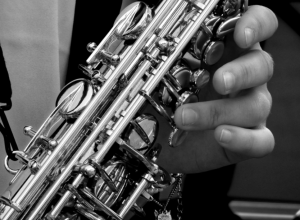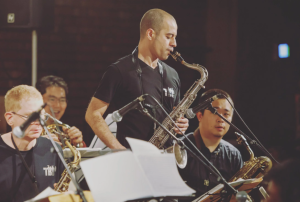For decades, scientists have been interested in the correlation between music and brain function. Several of these correlational studies have shown that children who underwent music training showed improved cognitive functioning in all areas of life and even excelled academically. Of course, the performance improvement was most evidently observed in areas that are closely linked […]

5 Reasons Why Every Musician Should Study Jazz
Every music genre has its own rules, methodologies, and tools that give it a unique twist and set it apart from the other genres. Learning a specific genre of music will always teach you something new that no other genre can.
That said, there is a music genre that won’t just teach you new methods of playing music but also transform the way you play music. Yes, we’re talking about jazz!
Jazz originated in the African-American community in Louisiana, New Orleans, during the late 19th century. It wasn’t until the 1920s (now called the Jazz Age) that this genre truly gained momentum and became part of mainstream music. It was also during this time that it became recognized as a major type of musical expression.
During the Jazz Age, many legends such as Louis Armstrong, Miles Davis, John Coltrane, and Ella Fitzgerald also surfaced and took the genre to a whole new level. In the early times, jazz was not just music; it was a way for different people playing different instruments to come together and communicate with each other through their music.
To date, jazz enthusiasts will tell you that this genre is magical—and we agree! There’s something truly magical about all the different sounds from diverse instruments gelling together to form a mesmerizing tune unlike any other. This is why we strongly believe that every musician attempting to widen their techniques should start by learning jazz.
In fact, learning jazz will unlock your musical talent even more and help you discover your own unique style. In this blog, we will discuss what makes jazz a unique genre of music and why every musician should consider studying jazz.
What Makes Jazz a Unique Genre?
Jazz is one of the most complex genres of music that can be quite difficult to nail, especially if you’re completely new to learning music. The rhythm, harmony, and melody of jazz are all unique and fuller compared to other forms of music. Every musician in a jazz band needs to bring a complete skillset to the table to take this form to the next level.
Fortunately, with some practice and understanding of this genre, you’ll be able to produce beautiful melodies and develop a high level of skill and adaptability as a musician.
All The Reasons Why Every Musician Should Study Jazz
Whether you already play a specific genre of music or a complete outside, you should consider learning jazz to broaden your horizon. This genre will not only help you become a better musician, but it will also make you more adaptable and definitely more knowledgeable about music.
Still on the fence about studying jazz? Keep reading to learn about all the reasons why you should take the leap!
1. It Builds Harmonic Knowledge and Expands Music Theory
Music theory may sound like it’s something complex that will complicate how you play music. Rest assured; music theory will actually help you play music much better and even help you discover ways to be creative with it. Essentially, music theory is simply a way to label the sounds you hear, and this can help you understand the science behind music.
Both jazz standard and jazz music also have a lot of harmonic information built into them in a diatonic as well as non-diatonic scale. So, harmony is present within the key and also outside of it. This will teach you how musical chords are built methodically, and of course, that will end up helping you understand music better and become more creative with it.
One of the best parts of playing jazz music is the diversity of chords that are available to all the musicians playing at a time. It’s famously said that jazz makes the most use of the seven chords, alterations, and extensions. These chords will help you learn everything you need to know about connecting different chords and how to do voice-lead.
2. Jazz Teaches You to Improvise and Adapt
Improvisation is one of the most important aspects of jazz. When you’re improvising with your music, you’re not following any particular map but using your personal choices, taste, and skills to chart the way. To that end, you’ll learn to rely on your own capabilities instead of simply following directions and get you more mentally and physically engaged with the instrument.
Once you get acquainted with the music theory of jazz, you’ll learn to improvise and create music as you go. This will allow you to be more open and malleable while giving you the opportunity to express yourself through your music and be creative with your musical expression.
Once you have that pegged, your harmony, melody, and rhythm will also deepen, and you can play confidently in just about all settings. The best part is you can play music without reading notes which will help you discover the full potential of your instrument. As it’s famously said, “Once you learn jazz, you don’t have to play Beethoven; you can become Beethoven!”
3. Jazz Makes You More Skilled and Proficient with Your Instrument
If you practice your jazz theory regularly (while improvising or jamming with others), you’ll ultimately learn to master your instrument. This is because jazz will force you to indulge in complex harmonies, go from fast to slow and slow to fast tempos, learn diverse rhythmic styles, and choose different arrangement possibilities.
Simply put, there’s no room for mediocrity in jazz. You have no choice but to be a master of the instrument of your choice, and no shortcuts will work in this case. If you embrace jazz completely, it’ll identify all the areas of improvement in your methods while putting you above the rest.
4. Jazz Will Make Your Ear Stronger
You can learn about music theory and understand all the chords and scales, but you won’t truly excel with your instrument until you develop a strong ear.
The key to developing a strong ear for music is to develop a connection between the theory and your ability to listen. This will help you identify scales and chords, which will improve how you perceive and play music. For this reason, jazz training involves the process of transcription, which involves learning common notes and licks by listening (rather than reading).
When you study and train in jazz, you’ll be required to transcribe all the time, ultimately giving you a stronger ear and the ability to hear every single chord and scale as you play it.
5. Jazz Theory Can Be Used in Other Genres
Many different musical genres emerge from jazz, including pop, hip-hop, blues, rock, and more. Once you learn jazz, you’ll have the tools to learn and play other genres proficiently as well because the stemming genres are comparatively much simpler.
If you’re looking to expand your music knowledge and play a wider range of genres, you can do this by learning jazz. This way, you can switch to other genres and adapt as needed. You can also alternate between different genres more swiftly, as jazz will give you more fluidity and adaptability as a musician.
If you’re interested in studying jazz to expand your musical knowledge and expertise, The Young Musician Music Institute is your best option. We provide a wide range of music certificate courses to beginners and enthusiasts, which include cello, drum, saxophone, and guitar lessons, as well as trinity classical and jazz. You can also enroll in our music theory or singing classes in Abu Dhabi to take your passion to the next level.
Book your free trial lesson today, or call +971 2 556 2080 or +971 2 678 3550 for more information.






